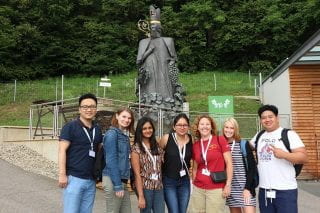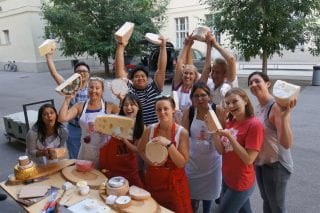This past July I had the amazing opportunity to take part in a study abroad course about food in Graz, Austria. While I probably ate three times the normal amount of food each day of the program, there is nothing I regret about this program except that it was not long enough! Two weeks? Give me a whole month or maybe even two! The food industry is Graz has been proven to be much more complex than what can be covered in a short time-frame, but I am appreciative for the time I got. Just to name a couple of unique foods that have a large presence in the Austrian cuisine, they have a large bean called “kaferbohnen” which translates to “beetle beans” and are a decent source of protein, and they also are famous for their pumpkin seed oil which can be used in salad dressings, on top of ice cream, or on pizza among many other things.
Having spent the majority of the past month in Graz, I’m finding it very hard to say goodbye. Many people may not have heard of Graz, but it is the second largest city in Austria; this makes it a perfect place to visit (and likely live, we’ll have to see if I can test that in the future) as it is a fairly large city with diverse offerings to keep one entertained while not being overrun with tourists and there is still the possibility to run into people you know semi-frequently. Despite the city slowing down on the weekends, there is still a lot going on that can be stumbled upon if you take the time to wander. I hadn’t expected to run into a musical art theater performance on my final day in Graz, but lo and behold, I found one right in the city center.
While I was able to notice some cultural differences between what I’ve become used to in America and the culture evident in Austria, there was nothing that startled me or was too much that I couldn’t quickly adapt to the situation. Typically, the noticeable differences were something to do with meals, such as dealing with restaurants or food, which is great in a way since it feels like the course is very relevant to the culture. Some differences I had encountered included tipping culture, as it is not non-existent in Austria as many may assume when thinking about Europe, that when eating out at a restaurant, you have to get the attention of the waiter and ask for the check, otherwise you will never see your check, and the lack of stores that are open either seven days a week or open later than 7:00 or 8:00 PM. The reduced opening hours of stores in Austria was a difference I quickly adapted to, but there were still many instances where I sat at a restaurant waiting for the check for 45 minutes before I realized I needed to ask. Another difference that I knew to expect, but will likely never adapt to, is their preference for room-temperature sparkling water and the lack of air-conditioning (specifically on days when the temperature is above 90 degrees Fahrenheit). Nonetheless, the cultural differences I noticed were not inhibiting or took anything away from the experience of this course.
The highlight of this course was undoubtedly the visit to the Silberberg School of Horticulture and Viticulture, in my opinion. The hands-on activity of creating juice, nectar, and distilled liquor was incredibly unique and educational. Additionally, we got to learn interesting facts about Austrian wine culture, such as how the country cannot produce as much wine as it consumes! Because there were so many tours and trips included in this course, it is hard to select a second favorite. If I really had to choose, my runner-up would be the visit to Gasthaus Haberl & Fink’s Delikatessen. We were instructed how to make a large variety of food produces which we then ate or jarred and took home, such as apricot marmalade and ratatouille. This blog only scrapes the surface of everything we experienced in this course, but for anyone that is interested in cooking or in food, generally, I cannot recommend this program enough!
To conclude, this course has provided me a great deal of motivation to explore the ways the field of food science is affected by culture. From this point forward, I cannot imagine not travelling at least periodically either for my future career or to personally enjoy what other countries have to offer. There are many opportunities to study abroad during one’s college experience and I certainly could have traveled more, but I am so glad and so thankful that I waited and was given the chance to partake in this particular one. I can only see this course improving as it is offered in future years and I encourage any and all students with interests in the cultural differences of food to look into this program.
-Aubrey Dunteman

